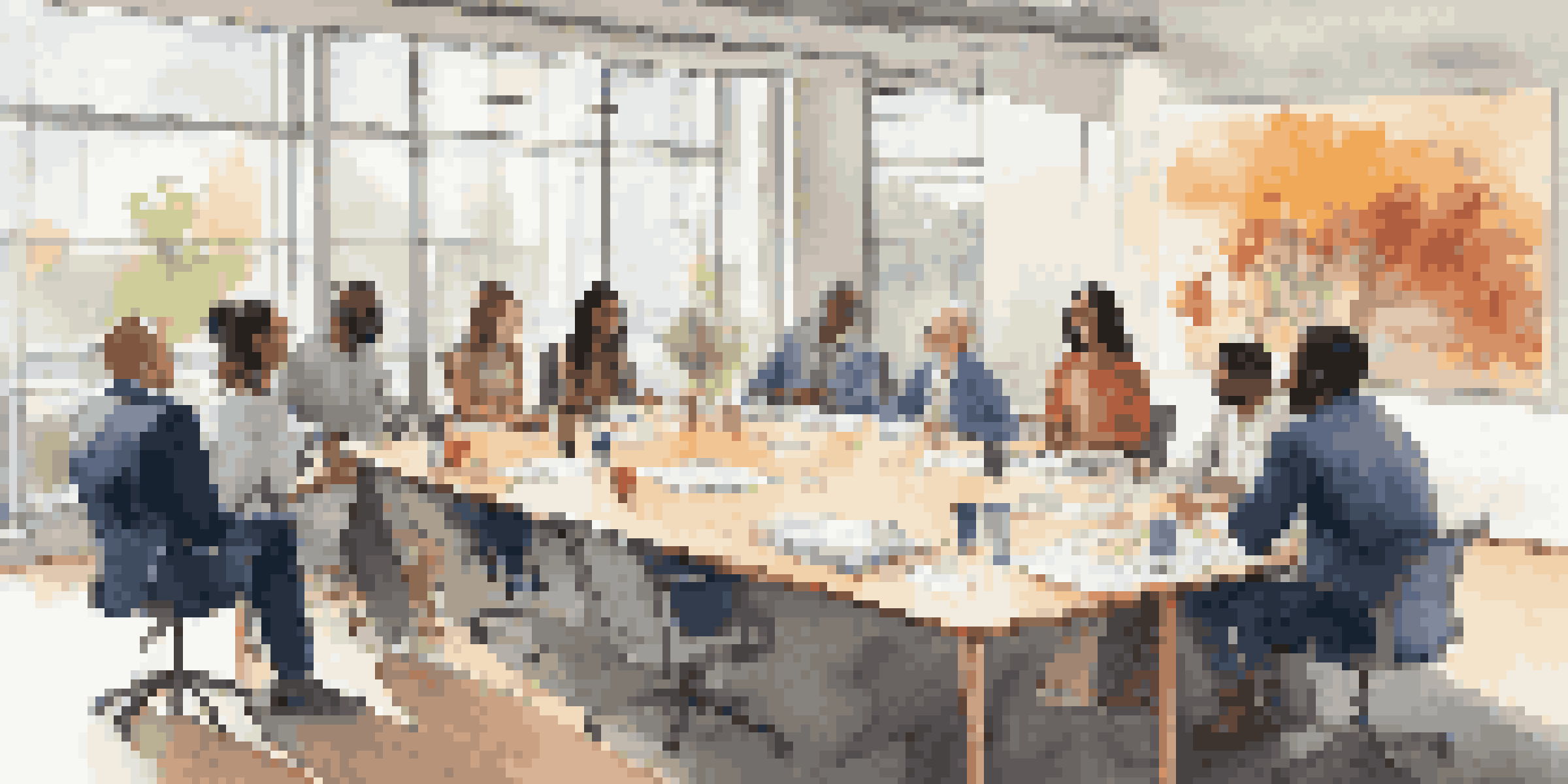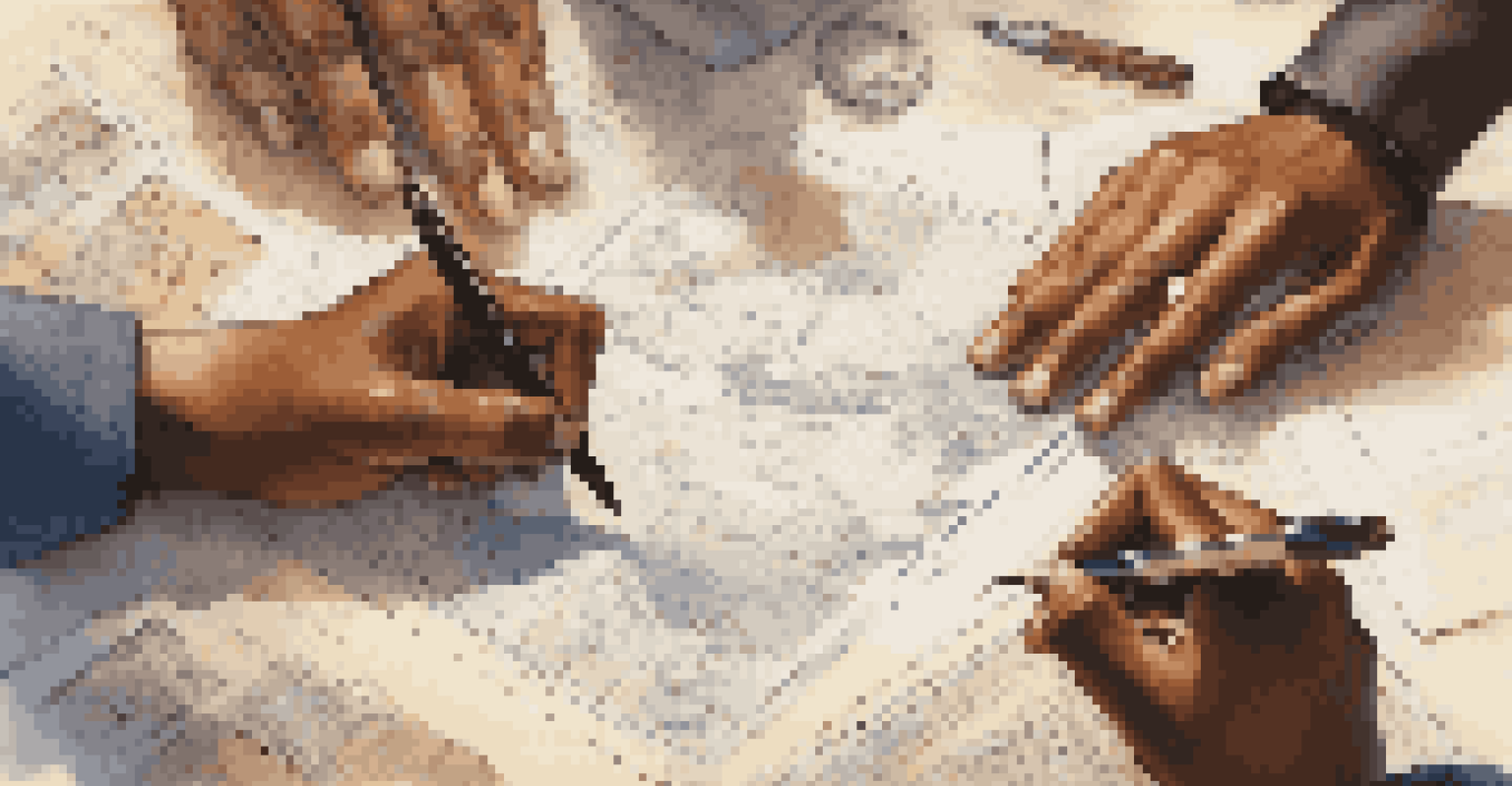Strategies for Adapting to Global Workplace Cultures

Understanding Cultural Differences in the Workplace
In today's globalized world, understanding cultural differences is crucial for workplace harmony. Each culture has its unique values, communication styles, and work ethics. For instance, while some cultures prioritize individual achievements, others focus on teamwork and collective success. Recognizing these differences can help employees navigate interactions more effectively and foster mutual respect.
Diversity is the one true thing we all have in common. Celebrate it every day.
Cultural awareness is not just about avoiding misunderstandings; it can also enhance collaboration. When team members appreciate each other's backgrounds, they are more likely to contribute positively to the group dynamic. This understanding can lead to innovative solutions, as diverse perspectives often yield creative ideas that a homogeneous group might overlook.
To get started, consider activities like cultural workshops or team-building exercises that celebrate diversity. These experiences can help break down barriers and encourage open dialogue. By investing in cultural education, organizations can cultivate a more inclusive environment where everyone feels valued.
Embracing Effective Communication Styles
Communication styles vary widely across cultures, making it essential to adapt your approach. For example, while some cultures favor direct communication, others may be more indirect. Understanding these nuances can prevent miscommunication and promote clearer exchanges. Adapting your style can involve being more explicit or, conversely, more nuanced based on your audience.

Active listening is a powerful tool in bridging communication gaps. By paying close attention to what others say and asking clarifying questions, you can demonstrate respect and foster trust. This practice encourages a two-way dialogue, making it easier to navigate misunderstandings and establish rapport.
Cultural Awareness Enhances Collaboration
Understanding cultural differences fosters mutual respect and can lead to more innovative solutions within teams.
Additionally, being mindful of non-verbal cues can significantly enhance your communication. Body language, eye contact, and gestures can carry different meanings in various cultures. By being observant and adaptable, you can ensure your message is conveyed accurately and received positively.
Building Relationships Across Cultures
Building strong relationships is vital for successful collaboration in a global workplace. Establishing trust often requires time and effort, particularly when dealing with different cultural expectations. For instance, some cultures may prioritize personal relationships before business, while others may focus solely on professional interactions. Understanding these preferences can help you approach relationship-building more effectively.
In diversity there is beauty and there is strength.
Participating in social events or informal gatherings can be an excellent way to strengthen bonds with colleagues. These settings allow for more relaxed interactions, making it easier to connect on a personal level. Sharing experiences and interests can also pave the way for deeper connections that benefit teamwork.
Moreover, respect for cultural traditions and celebrations can go a long way in fostering goodwill. Acknowledging and participating in your colleagues' cultural events shows appreciation and can enhance team morale. These gestures help create an inclusive environment where everyone feels valued and respected.
Flexibility and Adaptability in Global Teams
In a diverse workplace, flexibility and adaptability are essential traits for success. Being open to different perspectives and ways of working can help you navigate challenges that arise from cultural differences. For example, you might find that deadlines are approached differently in various cultures, requiring you to adjust your expectations and workflows accordingly.
Adopting a growth mindset can facilitate this adaptability. Embracing change and being willing to learn from your experiences will empower you to thrive in a multicultural environment. This mindset encourages you to view challenges as opportunities for personal and professional growth.
Adapt Communication to Cultural Nuances
Adapting your communication style, including active listening and being mindful of non-verbal cues, can help prevent misunderstandings in a multicultural environment.
Additionally, fostering a culture of feedback within your team can enhance adaptability. Regularly seeking input from colleagues can provide valuable insights into how cultural differences impact work. This open exchange of ideas can help everyone adjust their strategies and improve overall team performance.
Leveraging Technology for Cross-Cultural Collaboration
Technology plays a crucial role in bridging cultural divides in today’s remote work landscape. Tools like video conferencing, instant messaging, and collaborative platforms can facilitate communication and collaboration across time zones and geographical barriers. By leveraging these technologies, teams can work together more effectively, regardless of their locations.
However, it's essential to choose the right tools that cater to the diverse preferences of your team members. Some cultures may prefer written communication for clarity, while others might favor real-time discussions. Understanding these preferences can help you select the best platforms and tools for effective collaboration.
Moreover, implementing best practices for virtual communication can enhance cross-cultural interactions. Setting clear agendas, encouraging participation, and being mindful of time zones can ensure that everyone feels included and valued during meetings. By using technology thoughtfully, teams can foster collaboration and maintain productivity in a global setting.
Navigating Conflict in a Multicultural Environment
Conflicts are inevitable in any workplace, but they can be particularly challenging in multicultural teams. Differences in communication styles, values, and expectations may lead to misunderstandings that escalate into conflict. Recognizing these potential issues early can help you address them before they become significant problems.
When conflicts arise, it’s vital to approach them with empathy and understanding. Listening to all parties involved and acknowledging their perspectives can create a safe space for open dialogue. This approach not only helps resolve the immediate issue but also builds trust among team members.
Continuous Learning Builds Cultural Competence
Ongoing education and feedback about cultural practices are essential for developing cultural competence and improving workplace dynamics.
Mediation by a neutral party can also be beneficial in resolving conflicts. A mediator can facilitate discussions, ensuring that each voice is heard and respected. This process can help clarify misunderstandings and promote a collaborative atmosphere, leading to more effective conflict resolution.
Continuous Learning and Cultural Competence Development
Cultural competence is not a one-time achievement; it requires ongoing learning and development. Engaging in training sessions, workshops, or cultural exchange programs can enhance your understanding of various cultures. This commitment to continuous learning helps you stay informed about changing dynamics in the global workplace.
Reading books, attending webinars, or following thought leaders in the field can also provide valuable insights into cultural trends and best practices. These resources can help you broaden your perspective and adapt to new challenges as they arise. The more you learn, the more equipped you'll be to navigate complex cultural interactions.

Additionally, seeking feedback from colleagues about your cultural competence can promote personal growth. Constructive criticism can highlight areas for improvement and reinforce positive behaviors. Embracing this feedback creates a culture of learning and encourages everyone to strive for greater understanding and collaboration.